

A Neuroscientist’s Radical Theory of How Networks Become Conscious. It’s a question that’s perplexed philosophers for centuries and scientists for decades: Where does consciousness come from?
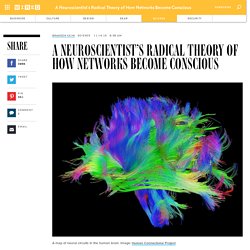
We know it exists, at least in ourselves. But how it arises from chemistry and electricity in our brains is an unsolved mystery. Neuroscientist Christof Koch, chief scientific officer at the Allen Institute for Brain Science, thinks he might know the answer. According to Koch, consciousness arises within any sufficiently complex, information-processing system. All animals, from humans on down to earthworms, are conscious; even the internet could be. “The electric charge of an electron doesn’t arise out of more elemental properties. What Koch proposes is a scientifically refined version of an ancient philosophical doctrine called panpsychism — and, coming from someone else, it might sound more like spirituality than science.
Scientists Claim That Quantum Theory Proves Consciousness Moves To Another Universe At Death. Learning Mind| A book titled “Biocentrism: How Life and Consciousness Are the Keys to Understanding the Nature of the Universe“ has stirred up the Internet, because it contained a notion that life does not end when the body dies, and it can last forever.
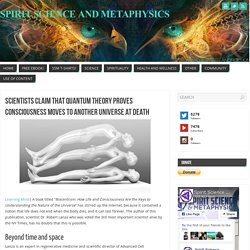
The author of this publication, scientist Dr. Robert Lanza who was voted the 3rd most important scientist alive by the NY Times, has no doubts that this is possible. Beyond time and space Lanza is an expert in regenerative medicine and scientific director of Advanced Cell Technology Company. Before he has been known for his extensive research which dealt with stem cells, he was also famous for several successful experiments on cloning endangered animal species. But not so long ago, the scientist became involved with physics, quantum mechanics and astrophysics. Consciousness Encompasses and Reflects Chaos and Order. Crows could be the key to understanding alien intelligence. The Trouble With Brain Science. Forget The Wisdom of Crowds; Neurobiologists Reveal The Wisdom Of The Confident. Can We Grasp The Brain's Complexity?
Can We Grasp The Brain's Complexity? The Existence of Collective Consciousness Explored in a Radical New Phone App. What does it really mean to say we are all connected?
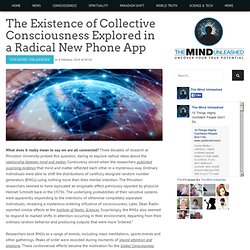
Three decades of research at Princeton University probed this question, daring to explore radical ideas about the relationship between mind and matter. Controversy stirred when the researchers published surprising evidence that mind and matter reflected each other in a mysterious way. Ordinary individuals were able to shift the distributions of carefully designed random number generators (RNGs) using nothing more than their mental intention. The Princeton researchers seemed to have replicated an enigmatic effect previously reported by physicist Helmet Schmidt back in the 1970s. The underlying probabilities of their sensitive systems were apparently responding to the intentions of otherwise completely separated individuals, revealing a mysterious ordering influence of consciousness.
Researchers took RNGs to a range of events, including mass meditations, sports events and other gatherings. Stanford Physicist: Vast, Powerful Realm Between Particles Influenced by Human Consciousness. Stanford University Professor Emeritus William A.
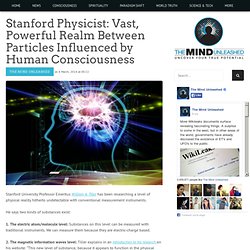
Tiller has been researching a level of physical reality hitherto undetectable with conventional measurement instruments. He says two kinds of substances exist: Scientists Discover Lightswitch for Human Consciousness. 10 Mind-Blowing Theories That Will Change Your Perception of the World. Reality is not as obvious and simple as we like to think.
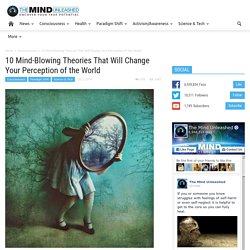
Some of the things that we accept as true at face value are notoriously wrong. Scientists and philosophers have made every effort to change our common perceptions of it. The 10 examples below will show you what I mean. The Power of Micro-Meditation. Sizing Up Consciousness by Its Bits. The anesthesiologist was preparing to give Dr.
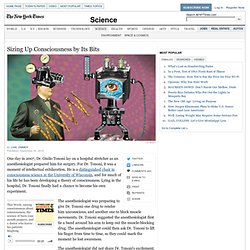
Tononi one drug to render him unconscious, and another one to block muscle movements. Dr. Tononi suggested the anesthesiologist first tie a band around his arm to keep out the muscle-blocking drug. The anesthesiologist could then ask Dr. Tononi to lift his finger from time to time, so they could mark the moment he lost awareness. The anesthesiologist did not share Dr. Dr. But Dr. “I love his ideas,” said Christof Koch, an expert on consciousness at Caltech. Dr. Eventually he decided to study consciousness by becoming a psychiatrist. A Neuroscientist’s Radical Theory of How Networks Become Conscious. Researchers decode how the brain miswires, possibly causing ADHD. New research shows memory is a dynamic and interactive process. Neuroethics: The Ethics of Brain Technologies. This ScienceLives article was provided to Live Science in partnership with the National Science Foundation.
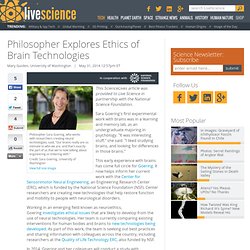
Sara Goering's first experimental work with brains was in a learning and memory lab, as an undergraduate majoring in psychology. "It was interesting stuff," she said. "I liked studying brains, and looking for differences in those brains. " This early experience with brains has come full circle for Goering. It now helps inform her current work with the Center for Sensorimotor Neural Engineering, an Engineering Research Center (ERC), which is funded by the National Science Foundation (NSF). Working in an emerging field known as neuroethics, Goering investigates ethical issues that are likely to develop from the use of neural technologies.
Name: Sara Goering Institution: University of Washington Hometown: Seattle, Wash. What is your field of research and why did you choose it? Une idée du cerveau [brouillon] Mirror Neurons. Brain. Neuro- Interesting Articles.